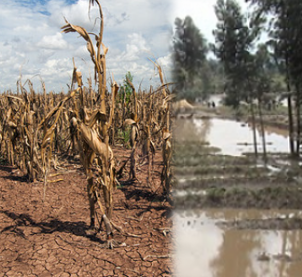Research on Sustainable Solutions to climate resilience in agriculture
The Research and Capacity Building for Sustainable Development (RCSD) through the EU funded project called Climate Resilience Agriculture; is conducting a country wide research on sustainable solutions to climate resilience in agriculture.
The Agriculture sector remains the backbone of the Rwandan economy and the largest source of employment countrywide. In Fiscal Year 2021/22, the share of agriculture in Rwanda's gross domestic product was 23% and its contribution to the national exports earns was 37%. PSTA 4 puts emphasis on climate change adaptation and mitigation as well as environmental protection through climate-resilient activities. Big investment projects were initiated to enable private sector to invest in agricultural and animal production and also to improve country food systems (MINAGRI 2022).
Considering the Rwanda’s Vision 2050, agriculture is expected to be totally transformed with professional farmers and commercialized value chains. The Vision targets to continue with strengthening the market orientation of crop and animal resources production systems, promoting research and innovation at all value chains nodes, building post-harvest handling and storage facilities across the country in order to achieve the envisioned transformed agriculture that benefit not only value chains actors but also the Country’s economy.
Agriculture is highly sensitive to climate change and extreme weather conditions such as droughts, floods and severe storms. This is so in Rwanda, since all farming activities are dominantly rain-fed[1]. Several factors account for the direct connection between climate change and agriculture productivity. These include average temperature increase, changes in rainfall amount and patterns; rising atmospheric concentrations of CO2; pollution levels such as tropospheric ozone; climatic variability and increase in frequency and intensity of extreme events such as droughts, floods, intense and destructive rains, as well as other related events such as landslides.
Increasing agricultural farmland productivity while minimizing environmental damage is essential to reach sustainable development. On one hand, the increasing human population and growing demand for healthier diets has stimulated fruit and vegetable production, especially in regions of the world where food insecurity is greatest. On the other hand, there is urgency to reduce environmental degradation and stop biodiversity loss. Promoting ecological intensification, whereby the productivity of agricultural land is increased through the enhancement of ecosystem services, rather than by conventional agriculture intensification that are key drivers of environmental degradation, is crucial.
This research will provide policy recommendations on how to strengthen agriculture resilience against climate change through partnerships and learning from best practices.
[1] REMA (2011). Guidelines for mainstreaming climate change adaptation and mitigation in the environment and natural resources sectors.



